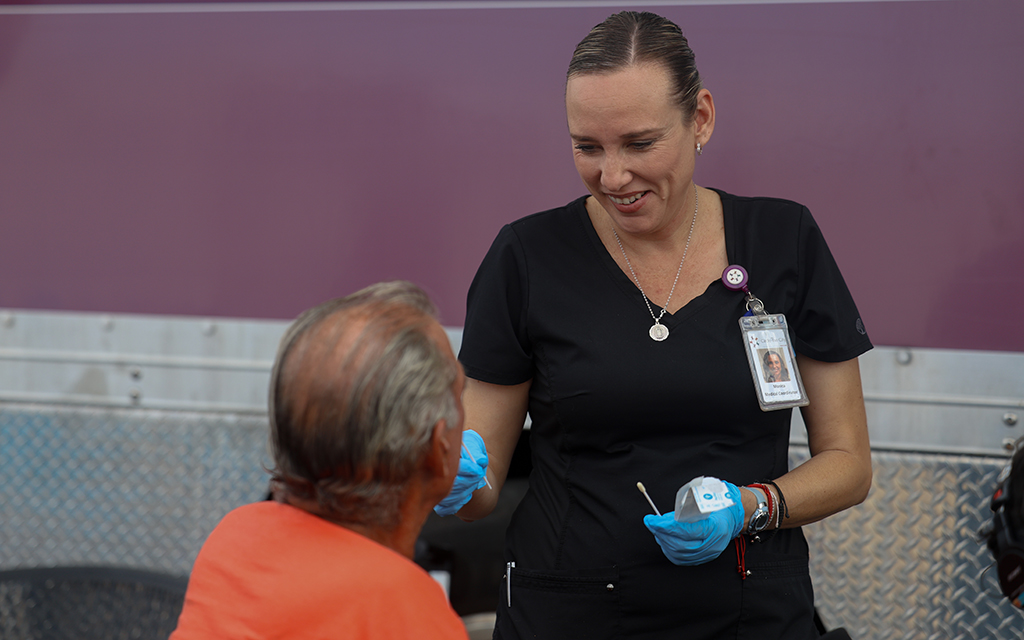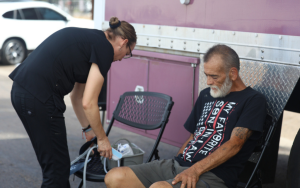
The homeless camp on W. Jefferson Street and S. 11th Avenue in Phoenix from Sept. 12, 2023. (Photo by Sam Volante/Cronkite News)

Medical coordinator Monica Rico provides additional testing kits to Douglas Walters at the Circle the City mobile clinic in Phoenix on Sept. 12, 2023. (Photo by Sam Volante/Cronkite News)

Dr. Mark Bueno advises patient Douglas Walters on his medical situation at the Circle the City mobile clinic in Phoenix on Sept. 12, 2023. (Photo by Sam Volante/Cronkite News)

Medical coordinator Monica Rico and community health worker Thomas Davis III exchange information to help a patient at the Circle the City mobile clinic in Phoenix on Sept. 12, 2023. (Photo by Sam Volante/Cronkite News)

Community health worker Thomas Davis III walks with a patient to his tent to administer medical care in Phoenix on Sept. 12, 2023. (Photo by Sam Volante/Cronkite News)
PHOENIX – Near the intersection of S. 11th Avenue and W. Jefferson Street in Phoenix, the heat is intense. For those who live along the street in tents and makeshift shelters, this heat can become fatal.
“My friend … in the street over here, from heat exhaustion.… He couldn’t breathe no more, because it got so hot,” said William Taft Cowan Jr., an unhoused resident of The Zone, a homeless encampment in Phoenix.
“Still young, you know?”
In addition to witnessing the death of his friend, Taft Cowan has felt the effects of the heat on his own health.
“The other day I had a seizure from it getting so hot…. I fell down and busted my finger over here. And it burned in my hands when I hit the concrete, burnt my knees too – it’s so hot, it’s like a frying pan.”
Phoenix posted 55 days of temperatures over 110 degrees Fahrenheit this summer, breaking previous records. And there are more hot days in Phoenix’s future. By 2050, according to Climate Check, Phoenix will, on average, have 44 days a year over 109.9 degrees, up from an average of seven such days a year between 1985 and 2005.
Even when extreme heat doesn’t kill, it harms.
Dr. Pope Moseley, a physician at Arizona State University’s College of Health Solutions, focuses his research on heat’s effect on human health. According to Moseley, heat redirects the flow of blood in the body.
“You have about five liters of blood flowing through your body, but you have 20 liters of pipe. So the body constantly makes choices about where that blood is going,” said Moseley.
Moseley says when it’s hot, blood flows to the skin to cool off the body. This rerouting of blood means less blood flow to vital organs, like the brain, which can impair function.
“The barrier between the brain and the blood, called the blood-brain barrier … keeps all kinds of stuff out of the brain,” Moseley said.
“That barrier begins to become more leaky, so stuff that wouldn’t cross over does cross over. Not just toxins from the outside, but toxins you produce – urea, nitrogen, ammonia – things begin to move into the brain.”
Moseley said that for every degree Celsius, suicide rates go up 1 to 2%. He says other health concerns similarly go up as heat rises, such as hospitalizations for dementia, depression and anxiety, along with kidney failure and asthma attacks.
For Moseley, what is notable is not that Phoenix broke the heat record that was set in 2020, but that it stayed so hot for so long this year. According to the National Weather Service, there have only been two days so far this month where the maximum temperature was under 99 degrees.
“It’s not so much how hot the temperatures get,” said Moseley, “it’s the fact that things didn’t cool off.”
“If you’re unsheltered, you have no protection, no cooling at all. So what worried me in Phoenix was not that it got to 118, it’s that it never dropped below 90 for several days.”

Medical coordinator Monica Rico provides additional testing kits to Douglas Walters at the Circle the City mobile clinic in Phoenix on Sept. 12, 2023. (Photo by Sam Volante/Cronkite News)
Those practicing street medicine for the unhoused population in Phoenix see the effects of heat on their patients. As of Sept. 12, the number of confirmed heat-associated deaths in Maricopa County this year had risen to 202, more than the 175 confirmed heat-associated deaths for all of 2022.
“Over the last two months we’ve seen symptoms related to heat stroke, severe dehydration, contact burns from the asphalt,” said Dr. Mark Bueno, a physician working with Circle the City, a nonprofit that operates a mobile clinic for Maricopa County’s unhoused community. Circle the City confirmed that it has seen more demand for its medical services this year.
Bueno also mentioned the heat’s effect on patients who need psychiatric medications or psychiatric evaluation.
“Imagine you have a patient who is on psychiatric medication. They have to go to their psychiatric provider for an evaluation, or if they have to go to their pharmacy … and say the location’s 1, 2, 3 miles away.… They don’t have cars. And when it’s 115 degrees, they’re not going to walk. So they can easily decompensate because they’re not getting the care they need.”
The heat also affects what street medics can prescribe to alleviate health concerns.
Perla Puebla, associate medical director at Circle the City, says sometimes people can’t get the right medications “because the medication can’t be outside or they can’t refrigerate it.”
“When we’re prescribing antibiotics as well, we have to be careful with letting them know that some of the antibiotics cause light skin sensitivities to the sun,” she said.
Douglas Walters, who was at Circle the City’s mobile clinic for assistance with a cold, has seen the effects of heat on people around him in The Zone.
“A lot of people passing out, you know, from the heat. It’s terrible. See, it may be 118, but with the road and that, it’s really like 130, 140 degrees, you know,” Walters said. “And the heat from all these cars and the heat from their motors, and they’re just blowing heat all over. It’s horrible.”

Medical coordinator Monica Rico prepares a blood pressure test for William Taft Cowan Jr. at the Circle the City mobile clinic in Phoenix on Sept. 12, 2023. (Photo by Sam Volante/Cronkite News)
Jose Yanez, a resident of The Zone who once received acclaim for backflipping on a BMX bicycle for the Ringling Bros. and Barnum & Bailey circus, and who did stunt work for the 1986 movie “Rad,” has his way of dealing with the heat. He came to Circle the City’s mobile clinic to pick up water and get treatment for a wound.
“I douse myself with water. I drink lots of liquids and water…. You gotta stay hydrated,” Yanez said.
Organizations like Circle the City help address unhoused peoples’ hydration and health care needs, but even in this community, disparities exist affecting access to care.
“Once a week I give out about 3,000 pounds of water by the case,” said Dr. Robert Fauer, medical director at Street Medicine Phoenix, an organization also focused on providing health care to the city’s unhoused population.
“And the one thing that I notice is the people with the most ability get the most product,” Fauer said. “So somebody who’s so feeble … can’t get out of their tent, they’re not coming and getting water from me.”
It’s an issue Fauer says he needs to figure out how to deal with. For some people who live in The Zone, however, solutions to their health care concerns and their lack of shelter aren’t coming fast enough.
“After a while, you get tired of asking for help,” said Taft Cowan.
“Because you ain’t gonna get no help. It’s a big lie. They just lie to you. They try to appease you. Hey, tomorrow there’s a program. Next week. Next month. Next six months,” he said. “How much do they appease you each time and moment to make you feel that maybe something’s coming down the pike?”
For Taft Cowan, the situation seems hopeless.
“I guess sometimes they just wish that we all just evaporate with the heat, they wouldn’t have to deal with it no more.”


